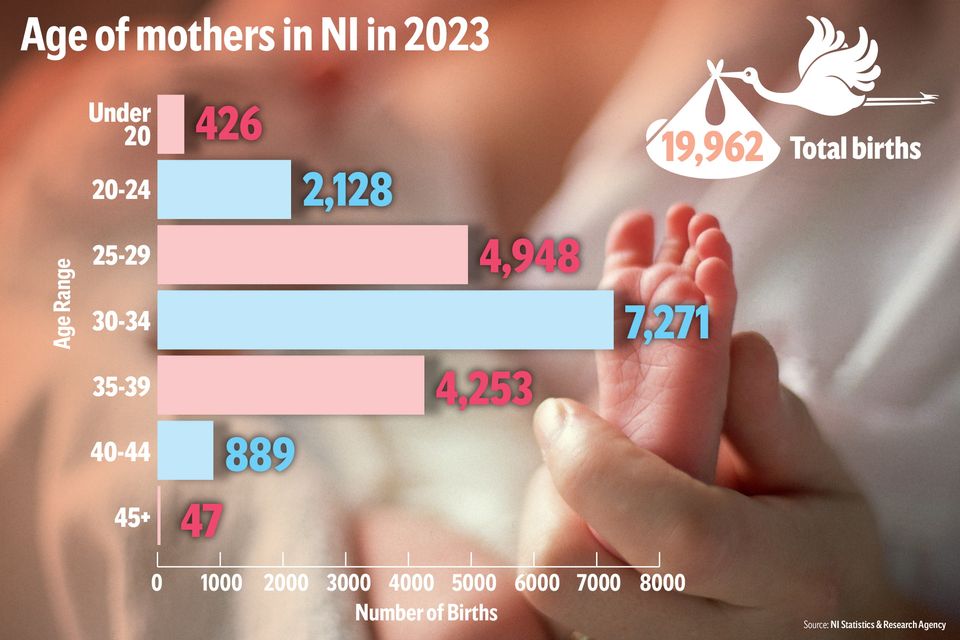The average age of first-time mothers in Northern Ireland has risen to a 30-year high, the latest statistics have shown.
Data published yesterday by the NI Statistics and Research Agency (NISRA) has revealed the average age of a first-time mum in 2023 was 29.5 years.
The figure represents an almost four-year increase from the average of 25.9 years recorded in 1993.
NI Statistics and Research Agency data revealed the average age of a first-time mum in 2023 was 29.5 years.
The overall average age of all mothers also rose during the same period from 28.3 years to 31.4 years old.
The report also indicated the number of births to teenage mothers had also decreased since 2022, with last year’s figure of 436 the lowest on record for women under 20 years of age.
However, as a proportion of all births, births to teenage mothers remained the same as 2022 at 2.1% of the total 19,962 births registered last year.
Of those registered births, 10,203 were male and 9,759 female, with 46.4% occurring outside of marriage or civil partnership, a figure more than double the 22% in 1993.
The stillbirth rate decreased in 2023 to 3.3 per 1,000 births from the previous year’s figure of 3.4.
Read more
Figures also showed a 13.7% decrease in the number of adoptions between 2022 and 2023, while the number of gender recognition registrations – individuals re-registering their birth with a new gender – increased to 20 last year, up from six in 2022.
Statistics also revealed NI’s couples are continuing to get married at an older age.
The average age for brides and grooms increased to 34.1 and 36.1 years respectively, compared with the 1993 figures of 29.4 and 27.3 years.
In total, 7,494 marriages were registered in 2023, with 89 conversions from civil partnership to marriage.
The average age of couples getting married has also risen
August was the most popular month to get married last year, with more than 1,000 marriages taking place. Some 39 civil partnerships were registered in 2023, a decrease from 43 the previous year.
Six of those involved male partnerships, four involved female partnerships, while 29 were opposite-sex partnerships.
More than 17,000 deaths were registered in NI last year, a 0.6% increase from the 2022 figure, with cancer accounting for 27% of all deaths.
The leading cause for death among males was ischaemic heart disease (11.4%), while among females the cause was dementia and Alzheimer’s disease (15.4%).
There were also 221 deaths attributed to suicide last year, an increase from 203 in 2022, with males accounting for three quarters of all deaths due to suicide (77.4%).
Sara Boyce, organiser at advocacy group New Script for Mental Health, said the figures were “deeply concerning”.
“This should be ringing alarm bells across the entire NI Executive,” she said.
“Instead of a reduction in what are preventable rather than inevitable deaths, we are seeing a sharp rise.
“We know that the impact on families of losing loved ones to suicide is devastating. These deaths also have a much wider societal impact, with an estimated 60,000 people affected each year.
“Time and time again, it is local communities and organisations who are the ones doing vital lifesaving work, with little or no resources or support.”

